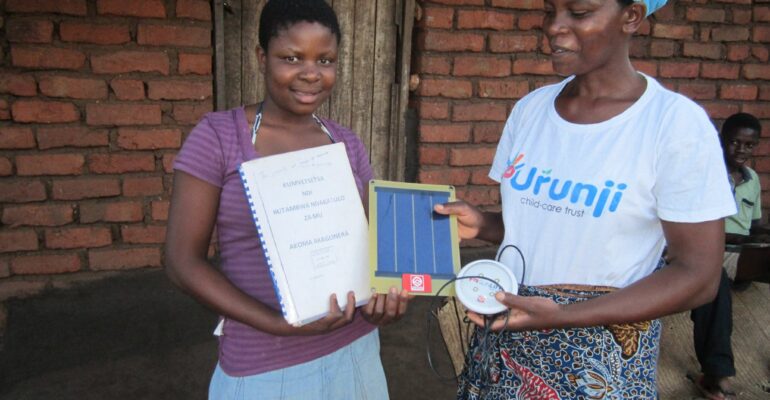
According to the United Nations, Malawi is one of the most energy-poor countries in sub-Saharan Africa. In recent years, there has been a push to secure sustainable energy for the country with solid investment from the World Bank (through Lighting Africa), the UK and Scottish Governments to name a few. SolarAid, an international charity aiming to combat poverty and climate change, is leading the solar revolution in Africa. To date, the charity has sold over 1.7 million solar lights to families across five African countries including Malawi, 90% of whom live below the poverty line.
The most current statistics (UNICEF, 2009-2012) show the number of children in primary education in Malawi was 283. However, less than 60 children in the same period were attending secondary school. Teachers from the village of Gumbi in western Malawi who now have access to solar electricity are delighted at the opportunities it provides. Children are able to stay at school longer to study, they are able to read at home and teachers are able to better prepare for the school day as they can prepare lessons in the evening and before the school day begins.
Solar energy also brings economic benefits for the community as people can save money on torches, candle, paraffin and batteries, reducing living costs. The greatest cost of solar energy is the cost of the lamp itself. Once it is obtained, energy is free. The lamps are also generating income in the community where people can charge for services such as charging mobile phones and businesses can produce more with increased light and working hours.
Urunji Child-Care Trust is working with Real Relief to eradicate the use of kerosene lamps by 2020 in the area we work. “It’s an ambitious project.” says Ian C Maliseni, Director of Urunji Child-Care Trust. “But with your support we will work together with Real Relief to make this dream a reality“.
Currently, many households use kerosene, an ineffective source of energy that does not produce sufficient light and is costly to both the user’s health and the wider environment. SolarAid estimates that the use of one kerosene lamp in a household emits around 200 kilograms of carbon dioxide per year, a huge impact on the environment affecting climate change. The impact of solar energy on health and sanitation in developing countries such as Malawi is also significant as it can also be used to make saline water meaning that waste water can be treated without using electricity or chemicals.
So how can you help communities in Malawi obtain this amazing clean, renewable energy source? The Urunji Child-Care Trust has been a long supporter of environmental sustainability and runs an environmental recovery programme to mitigate climate change. By providing green energy to communities, Urunji Child-Care Trust is helping to better education, health and economic development. You can join the solar revolution by donating here – $100 can provide two solar lanterns, a great investment for creating sustainable futures for people in Malawi. Need we say more?
